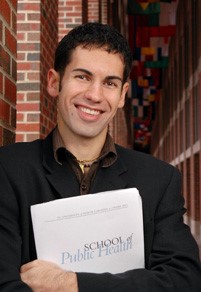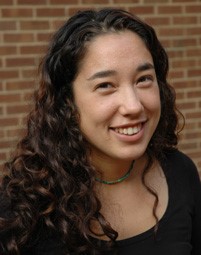

A publication of The Graduate School, University of North Carolina at Chapel Hill
On-Line Version Spring 2005
Home | Back issues | About us | The Graduate School | UNC-Chapel Hill | Make a gift
Where help is needed most
Graduate students serve global communities
 |
| Scholars for Tomorrow student Rebeen Pasha came to the United States as a refugee from Iraq in 1997. He hopes someday to work with refugee populations. |
Rebeen Pasha understands first-hand the unique needs of refugees from places torn by war and humanitarian disasters. Just eight short years ago, Pasha and his family fled from northern Iraq to northern Virginia to escape Saddam Hussein’s murderous campaign of ethnic cleansing against the Kurds.
As a master’s student in the School of Public Health and a participant in the Scholars for Tomorrow Global Studies seminar, Pasha is drawing on the painful memory of his own experience to serve the health needs of other refugee populations.
“Having been a refugee myself made me realize how much I’m privileged for having survived it and to be able to think about it now,” Pasha said. “I want to explore the whole refugee experience and see how that affects their mental and social health.”
The opportunity to explore these and other issues is central to all of the Scholars for Tomorrow seminars – Aesthetics and Society, Computational Sciences and Health Care Ethics in addition to Global Studies. The Scholars are new graduate students who receive one-year stipends generously supported by private donations to The Graduate School. This support allows Scholars to benefit from an interdisciplinary approach that draws on the diverse talents of students from various departments.
This interdisciplinary appeal was a large part of what brought Pasha to Carolina.
“Carolina has this belief in interdisciplinary studies that allows you to weave together a program that suits your needs,” he said. “It’s been a great opportunity to sit down and explore ideas with other people who are interested in global issues.”
After completing his master’s degree in public health and policy, Pasha plans to work with aid groups in his native Kurdistan before going to medical school and serving refugee populations around the world.
 |
| Public policy doctoral student Amber Peterman has worked in health education and economic development in Africa. |
 |
| Political science student and Royster Fellow Amy Davis investigates ways to create stable economic institutions in developing countries. |
This strong dedication to service is a common thread shared by most of the Global Studies Scholars for Tomorrow. Amber Peterman, a public policy doctoral student, is an example of this idea in action.
After graduating from the University of California at San Diego, she worked in Ghana helping the poor obtain small-business loans.
“Typically [our clients] were women who wanted to start a food stand or some small little shop,” Peterman said. “There’s no way else that they could get that money.”
Peterman also educated people about women’s health and HIV/AIDS for a grassroots organization in Cameroon. After finishing her degree, she plans to return to Africa to help develop health or economic development policy.
“A lot of places aren’t very safe right now,” she said, “but they’re the places that need help the most.”
Peterman believes that the Scholars for Tomorrow seminar has helped her intellectual development and allowed her the financial freedom to pursue her own interests more vigorously.
Of course, graduate students interested in helping with global problems are spread throughout the University. Amy Davis, a Thomas S. and Caroline H. Royster Fellow and fourth-year doctoral student in political science, is researching ways to create stable economic institutions in developing countries.
“I’m interested in how lesser developed countries can build the institutions that allow their citizens to fully participate in this global economy,” she said. “The noble, bold goal out of all this is to raise the standard of living, life expectancy, quality of food consumption and quality of life.”
Davis said that the financial support of her Royster Fellowship has given her the freedom to focus on her own research and work toward tangibly improving the lives of people in the developing world.
“I don’t want to just publish in journals and have it on my resume,” she said. “I hope that what I do actually does matter.”
- Erik Holmes
© 2003, The Graduate School, The University of
North Carolina at Chapel Hill
All text and images are property of The Graduate School
at the University of North Carolina-Chapel Hill. Contact Sandra Hoeflich
at shoeflic@email.unc.edu
to request permission for reproduction.